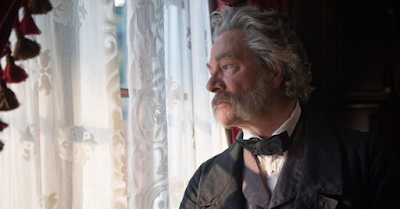Mr. Morris and Mr. Pappademas did not define the criteria for their awards so much as just sort of shout out random guidelines in the discussion, but that was part of their charm. Ruffalos went to “People who aren’t getting nominated for anything.” To earn one “you gotta be playing the background a little bit,” or maybe not since some of the recipients were more in the spotlight rather than the background. And whatever, because The Ruffalos were more ineffable, something less stately and more tossed off, make-believe statues concerning a life-force that was more indelible than mere pomp. And because Grantland and, in turn, Do You Like Prince Movies? have been shuttered, Cinema Romantico, this itty bitty blog that most people stop reading at the first sign of a ham-fisted Keira Knightley reference, has taken on the task of keeping them alive. We did last year, and the year before that, and the year before that, etc., and we do again this year.
The Ruffalos go to.....
Eric Stoltz, Her Smell. If Alex Ross Perry’s film is deliberately owned by Elisabeth Moss as a cantankerous, loquacious, volatile, possibly even possessed rock star plunging toward the abyss, Stoltz, playing her manager, exudes a man weathering a storm in a performance as a kind of virtual deep breath, those omnipresent cigarettes not just props but little buoys his character uses to ride out his meal ticket’s episodes. Indeed, throughout Stoltz ever so slightly lets his exhaustion shade into indignation, a man who knows her mental state is also his bottom line.
Hailey Gates, Uncut Gems. You could make a Ruffalo case for multiple “Uncut Gems” cast members, but Gates, I think, as the receptionist at a fancy-pants auction house where Adam Sandler’s jeweler is trying to sell a gem for millions, is most emblematic of the movie’s incredibly deep layers. In just a couple minutes, she evinces an unruffled, haughty air borne of turning the tables on pushy know-it-alls for a living which allows her, in the simple act of placing a follow-up phone call, to lay Sandler’s character’s haplessness hilariously bare.
Chris Cooper, Little Women. I know, I know. Giving a Ruffalo to one of the dudes in “Little Women”? But that’s the thing – Cooper gets it. He lets himself fade into the background in every scene.
Sophie Okonedo, Wild Rose. Okonedo’s character, Susannah, a wealthy housewife for whom Rose-Lynn (Jessie Buckley), the chief protagonist, might exist merely as a conduit to Rose-Lynn’s singing dreams, but Okonedo nevertheless brings the character to life, playing the part with a good-humored eagerness that suggests, despite obvious love for her own children, a deep yearning for artistic fulfillment.
Martha Kelly, Marriage Story. That the climax of “Marriage Story”, in which Charlie (Adam Driver) has to prove his capabilities as a father for a court-ordered social worker (Martha Kelly), descends into wrenching, sidesplitting farce is as much a testament to Kelly’s deemphasis as it is to Driver’s escalating comical frenzy. Her character’s presence might be the point, but she plays the whole scene like a wide-eyed bystander, where every question she poses becomes a needle prick she didn’t expect to draw so much blood.
Timothy Olyphant, Once Upon a Time... in Hollywood. Truly, a supporting turn is meant to help shine the spotlight directly on the star while the person in support dutifully steps out of it. And even if Olyphant is playing the lead actor on a fictional TV show in which Leonardo DiCaprio’s faded star is making a guest turn in support, Olyphant illustrates both a deference for DiCaprio and, on a deeper level, for DiCaprio’s character, like a protégé to a mentor, never more lovingly than in the scene where he just bides his time at a table in the foreground while DiCaprio’s character expresses immense frustration at screwing up lines.









No comments:
Post a Comment